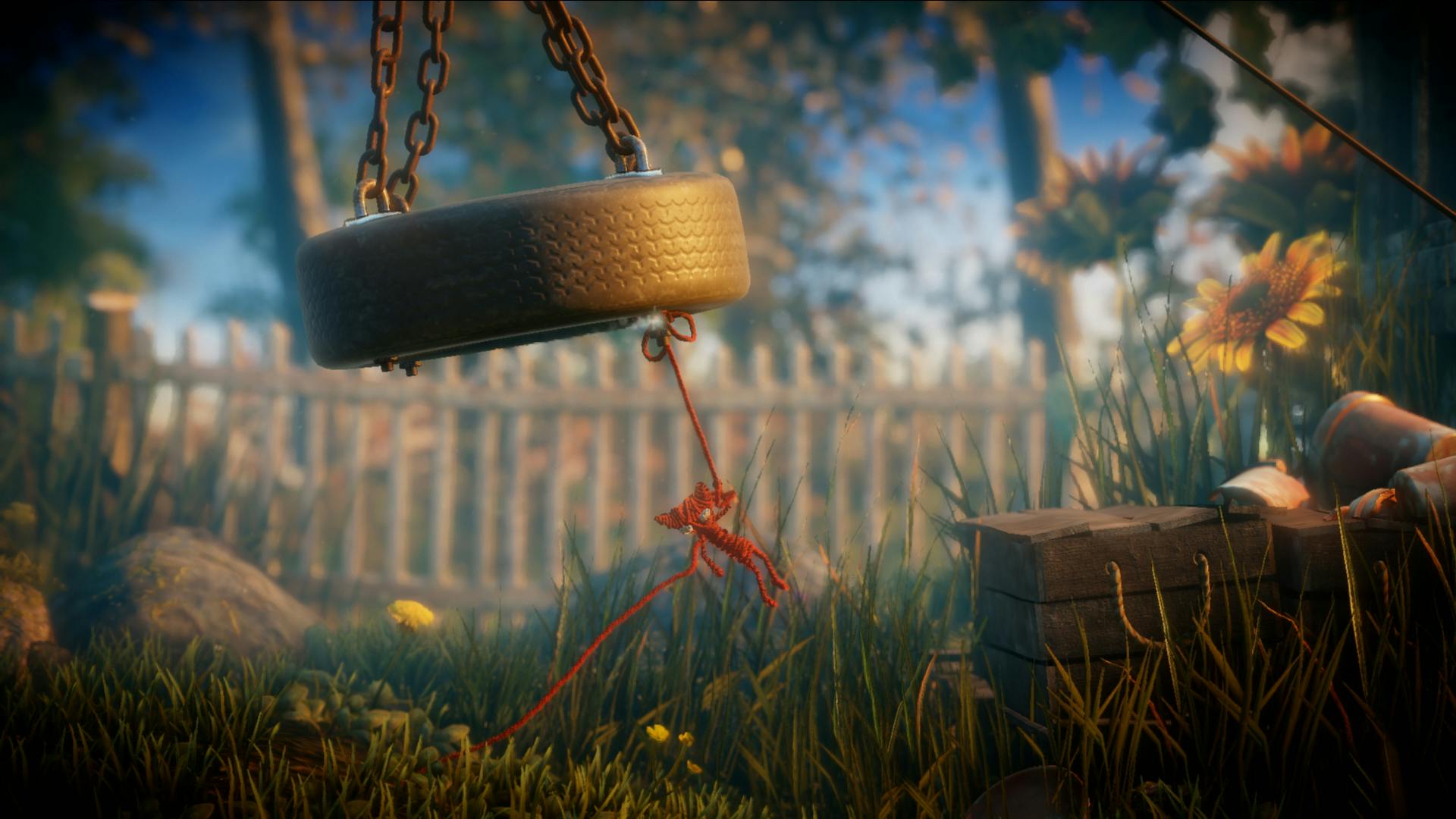It was just eight months ago that the gaming world discovered Unravel during a charming presentation by indie game developer Martin Sahlin at E3 2015. In obvious contrast to the smooth marketing glitz typical of E3 showcase events, a very nervous Sahlin appeared on stage and shakily pitched Coldwood Interactive’s little puzzle platformer about a yarn doll, instantly winning everyone over.
Now that the game is ready for release, it’s still an oddball, when you consider publisher Electronic Arts’ usual line-up of Madden, The Sims, and Need for Speed. The game is also, thankfully, still a charmer.
In Unravel, you play as Yarny, a curious red yarn doll that has a yearning for exploration. From the outset, not much is known except that you live in a house with an elderly woman who has displayed photos of various family outings around her living room. As you walk up to picture frames, you can enter them and relive her memories.
Levels feel like dream sequences out of a Pixar animated short. As you run from left to right, there’s a bokeh effect surrounding the levels. Backgrounds have a soft blurriness while the foreground is focused. There’s a pristine quality to the memories, a kind of nostalgic rendering that records only their most beautiful aspects.
While different levels try to elicit certain emotions from the player, one theme is ever present: an appreciation for nature. To accomplish this, the game makes great use of its graphics engine. Objects shimmer against sunlight, providing a glowing ambience. Water flows with realism and snowflakes sprinkle gently down.
To accent the art, a wonderful soundtrack has been composed, with a heavy emphasis on stringed instruments. There’s a rustic earthiness that comes with a violin heavy score, played with a fiddle-like style. The music does an equally great job of underscoring the more depressing scenes. There’s no dramatic crash of cymbals or blast of horns. These moments are instead accented by somber notes that hit the piano with weighty keystrokes.
Yarny’s small stature adds gravity to his environment. Even when in such beautiful surroundings, everything is a potential hazard. From rolling rocks to dastardly crows, you must navigate your way around obstacles to get to the end.
When it comes to maneuverability, Unravel has some interesting gameplay mechanics. As a physics-based puzzle platformer, you have to manipulate Yarny around the environment to climb up benches or swing away from threats. To get around obstructions, you can use your yarn as a rope to climb and swing, or even create platforms. As you run, you’ll notice that Yarny leaves behind a trail of yarn. And as you move further along, Yarny will slowly start to unravel. Luckily there are checkpoints that refill your yarn to keep you going.
The yarn swinging and grabbing mechanics work really well and quickly become innate. I was swinging from branch to branch like Spider-Man with little effort. It’s clear the developers spent lot of time crafting easy-to-use mechanics.
Puzzles themselves are fairly intuitive, but the environment-based puzzles established on the game’s real-world physics can lead to some frustrating moments. You may find yourself stuck on a puzzle for 20-30 minutes. There are also times when you feel limited by your movements. It’s not like Yarny can run particularly fast or jump incredibly high. It’s at these moments that the game is at its worst, but fortunately there aren’t many of them. Once you pass these situations, the game moves at nice pace.
The one thing that surprised me was the length of the game. Usually platformers have levels that last three to five minutes. This was not the case with Unravel. Each of its 10 levels can take anywhere from 15-45 minutes to complete, depending on how stuck you get. That’s a lot of gameplay from a title that’s considered indie. At first I felt that the levels were too long, but I quickly adjusted to the length. The game may drag on too long for some, but I think it was an appropriate length that tidily came together at the end.
Unravel illustrates well why gaming is such a special medium. Even when a game feels like a living painting, it can hide serious challenges that require the player to dig in. Unravel could have easily been a walk-in-the-park type puzzle platformer—a simple medium for its spectacular scenery. And with a character as warm and innocent as Yarny, I wouldn’t be surprised if the team at Coldwood asked themselves if the game’s puzzles were too hard. But it’s clear the developers weren’t scared to push the game and challenge the player. The team wanted to make it more than just a cute face and pretty graphics. Even if puzzles can seem obtuse, seldom do they ever feel impossible. The few faults in Unravel can be excused, because it’s so well executed. With the emotions it stirs and the warmth it makes you feel, it’s obvious that a lot of heart was poured into this game. Spend some time with Unravel, and you’re sure to be looking for a Yarny doll to adorn your cubicle.
Disclosure: Our PlayStation 4 review copy of Unravel was provided courtesy of Electronic Arts. Unravel was also released for PC and Xbox One.
Illustration via Electronic Arts




